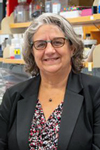Funded Projects
2024-2025 Pilot Award Recipients
Building Social Connections for Caregivers of Persons with Dementia from Underserved Communities


 PI/Investigators: Sandhya Seshadri, PhD, MA, MS, Paula Amina Alio, PhD, and Benzi M. Kluger, MD, MS
PI/Investigators: Sandhya Seshadri, PhD, MA, MS, Paula Amina Alio, PhD, and Benzi M. Kluger, MD, MS
Funding Source: UR Aging Institute and Office of Health Equity Research (OHER)
The Alzheimer’s Association estimates there are 6.9 million Americans living with dementia in the United States (2024 Alzheimer’s Disease Facts and Figures). The majority of persons with dementia are cared for by unpaid family members. Health inequities and the lack of access to clinical care and support can make caregiving more challenging for Black caregivers from underserved communities. With limited support, these caregivers may experience significant social disconnectedness and loneliness that is often associated with negative physical and mental health.
The UR Aging Institute has partnered with The Office of Health Equity Research (OHER), part of the Center for Community Health & Prevention (CCHP) at the University of Rochester Medical Center, to fund this new research initiative in support of aging and health equity. This project aims to build social connections and decrease social isolation and loneliness among Black caregivers by developing an intervention that is scalable across marginalized Black communities.
Role of Aged Bone Marrow Stromal Microenvironment in Hematological Malignancies




PI/Investigators: Jeevisha Bajaj, PhD, John Ashton, PhD, Vera Gorbunova, PhD, Laura Calvi, MD
Funding Source: UR Aging Institute
The overall incidence of aggressive blood cancers such as Acute Myeloid Leukemia (AML) is increasing with our aging population. Given that the survival outcomes of patients >70y is less than 5%, there is a significant need to better understand aging related changes that promote disease initiation and therapy resistance. AML initiates from mutations in the hematopoietic stem cells that reside in the bone marrow. Work by us and others has shown that signals from bone marrow microenvironmental populations, such as the endothelial cells and mesenchymal stromal cells, can sustain therapy resistant leukemia populations. However, it is not known if aging can alter the cellular and molecular composition of the bone marrow niche, enabling disease initiation and progression. Here, we propose determine temporal changes in the bone marrow niche with aging and define niche-driven signals that promote disease initiation and progression in the elderly. In the long term, our studies may enable development of novel therapeutics aimed at targeting AML in aged populations.
The impact of Child Maltreatment on Accelerated Brain Aging and Cognitive Decline in Middle Adulthood: A Prospective MRI and Behavioral Study


Investigators: Elizabeth Handley, PhD, David Dodell-Feder, PhD, Feng (Vankee Lin), PhD, RN
Funding Source: UR Aging Institute
Child maltreatment increases risk for chronic diseases of aging. Stress-related wear and tear to many biological systems may explain these effects. The purpose of this study is to examine the feasibility and acceptability of adding neuroimaging and cognitive assessments to an ongoing long-term study of the impact of child maltreatment on health in adulthood. This ongoing study already includes measures of neuroendocrine, epigenetic, and inflammatory processes. Adding assessments of brain age and cognition, will allow for a preliminary understanding of whether child maltreatment accelerates brain aging and cognitive decline in middle adulthood. It will also facilitate an examination of the links between brain aging and other biological processes indicative of aging that may be affected by child maltreatment. The overarching aim is to advance knowledge of the biological processes driving aging-related morbidity among those exposed to child maltreatment, to inform interventions to slow down and reverse these processes.
2023-2024 Pilot Award Recipients
Pilot Testing of a Novel Palliative Care intervention (AKI-DIALYSIS) to Help Critically Ill Older Adults and Families with Dialysis Decision-Making



PI/Investigators: Fahad Saeed, MBBS, MS, FASN, Kevin A. Fiscella, MD, MPH, Ronald M. Epstein, MD
Funding Source: UR Aging Institute
Older adults over 75 are increasingly needing dialysis for acute kidney injury (AKI) in the US. This is more common than end-stage kidney disease and comes with high costs and poor outcomes. However, clinicians often don't engage patients and families in discussions about treatment options, prognosis, or the impact of dialysis on future life. Older patients value quality of life over extending life, but this isn't discussed either. Unfortunately, many patients with AKI receiving dialysis die in the ICU, and survivors frequently have a lower quality of life. The study aims to improve decision-making for AKI by adapting and testing a palliative care intervention called AKI-DIALYSIS. The study team will get feedback from stakeholders and test the intervention for feasibility and acceptance. This study is innovative as it's the first to help older adults and families make decisions about acute dialysis.
Transdifferentiation of Synovial Extracellular Matrix Producing Fibroblast to Inflammatory Fibroblast in Osteoarthritis During Natural Aging

 PI/Investigator: Xi Lin, PhD
PI/Investigator: Xi Lin, PhD
Consultant: Meghan L Falsetta, PhD
Funding Source: UR Aging Institute
Osteoarthritis is a debilitating disease affecting 300 million people worldwide with no disease modifying therapies. Our current understanding of OA pathology is mostly based on biopsy samples of about 1% of patients with severe OA undergoing joint replacement procedures. Aging is the greatest OA risk factor OA. Unlike OA joints that require knee replacement procedures, usually accompanied by surround soft tissue hypertrophy and synovitis, natural aging joints present a distinct atrophy phenotype. Interestingly, our recent single cell RNA sequencing data of knee joint soft tissue from natural aging mice revealed the loss of the extracellular matrix producing synovial fibroblast that differentially express the early growth response 1 (Egr1) transcription factor. In this application we will elucidate the upstream regulation of Egr1 transcription in synovial fibroblast, and investigate whether the loss of Egr1 leads to the loss of the extracellular matrix producing phenotype of synovial fibroblast and age-related OA progression. Modulating Egr1 and synovial fibroblast may translate to the development of early preventative or interventional therapies for OA during aging.
The Impact of Age on the Phenotype and Function of CAR-T Cells in Patients with Diffuse Large B-Cell Lymphoma: Implications for Toxicity and Outcomes


 PI/Investigators: Carla Casulo, MD, Danielle Wallace, MD, Tim Mosmann, PhD
PI/Investigators: Carla Casulo, MD, Danielle Wallace, MD, Tim Mosmann, PhD
Funding Source: Wilmot Cancer Institute and UR Aging Institute
Chimeric antigen receptor (CAR) T cell therapy is utilized in patients with relapsed or refractory diffuse large B-cell lymphoma (DLBCL). This procedure transduces a patient’s own T-cells with a receptor that targets a cell surface antigen on lymphoma cells, thereby making use of the patient’s immune system as therapy. This only results in disease control for about 50% of patients, who are at risk for severe toxicity due to cytokine release. Consequently, older patients with DLBCL are less likely to be offered CAR-T therapy due to perceived inability to physiologically tolerate severe toxicity. There is limited prognostic information to guide clinicians on an individual’s ultimate benefit from CAR-T therapy or risk of severe toxicity, which makes the decision to offer this therapy to older patients more challenging. The proposed study plans to analyze CAR-T samples to identify specific cell types and cytokines associated with patients’ age, that will be correlated with their response and toxicity, with the plan to identify these age-related cell changes in future samples. This would allow for a subsequent clinical study to identify factors that are predictive of patient’s response or toxicities, to guide older patients on the likelihood of their individual outcome.
2022-2023 Pilot Award Recipients
Aging of Transcriptional Enhancers In Drosophila Tissues

 PI/Investigators: Benoit Biteau, PhD, Patrick Murphy, PhD
PI/Investigators: Benoit Biteau, PhD, Patrick Murphy, PhD
Funding Source: UR Aging Institute
Aging is characterized by the functional decline of tissues and cell lineages, leading to loss of organ function and maintenance, impaired physiology and increased disease incidence. Proper regulation of gene expression is critical to maintain cellular phenotypes and preserve tissue homeostasis, both by protecting non dividing cells and supporting stem cell function. In this project, we will explore the deterioration of epigenetic landscapes that may cause irreversible loss of gene inducibility, focusing on aging brain cells and intestinal stem cells. We will take advantage of the fruit fly Drosophila melanogaster as an experimental model and investigate the role of the histone variant H2Av in maintaining the activity of the transcription factors Nrf2 and Sox2. We anticipate that our studies will identify general principles that drive the aging process across organisms, including in humans.
Pilot Clinical Trial of Fucoidan to Alleviate Frailty and Reduce Biological Age in Older Adults with Cancer Following Chemotherapy







PI/Investigators: Vera Gorbunova, PhD, Michelle Janelsins, PhD, Luke Peppone, PhD, Jeremy McGuire, PhD, Nikesha Gilmore, PhD, Melissa Loh, BMedSci, MBBCh, BAO, MS, Michael Sohn, PhD
Funding Source: UR Aging Institute
Fucoidan is a sulfated polysaccharide found in brown algae. Fucoidan is available as a dietary supplement and is safe for human consumption. Recently we identified fucoidan as a strong activator of the longevity gene SIRT6. Increased levels of SIRT6 in mice and flies extend lifespan and confer multiple health benefits by promoting genome stability. Therefore, finding potent and safe SIRT6 activators has the potential to confer rejuvenating effect and extend human lifespan and healthspan. Furthermore, we showed that 2-months of fucoidan supplementation reduced frailty scores in aged mice. Given these findings, we will conduct a pilot clinical trial to preliminarily assess whether fucoidan supplementation reduces biological age and alleviates frailty symptoms in human patients recovering from chemotherapy treatments. We will also assess feasibility and acceptability of the intervention.
Increasing Wellness For Latino Older Adults With Vision Loss – Aumento Del Bienestar Para Ancianos Con Perdida De La Visión



 PI/Investigators: Silvia Sörensen, PhD, Maria M. Quiñones-Cordero, PhD, Diana Fernandez, MD, MPH, PhD, Rajeev Ramchandran, MD
PI/Investigators: Silvia Sörensen, PhD, Maria M. Quiñones-Cordero, PhD, Diana Fernandez, MD, MPH, PhD, Rajeev Ramchandran, MD
Funding Source: UR Aging Institute
The Centers for Disease Control (CDC) have identified irreversible vision loss as a public health concern for older adults. Vision loss leads to difficulties with reading, driving, and engaging in social and recreational activities, contributing to high rates of social isolation and depression and poor self-care for age-related diseases, such as diabetes. The prevalence of VI and its after-effects is elevated for Latinos; social structural, health and health access factors exacerbate poor long-term health and mental health outcomes for Latinos with vision loss. Our 10-week evidence-based Resilience Building Program for older adults with vision loss can alleviate and prevent depression symptoms, but it requires cultural adaptation to Latino cultural norms. Our long-term goal is to provide more effective, community-informed intervention and care models for older Latinos; this pilot grant allows us to: Aim 1a. form a Vision Loss Subcommittee (VLS) within our larger Latino Caregivers Community Advisory Board, Aim 1b . culturally adapt the RBP in an iterative adaptation process and collaboratively with VLS members Aim 2. pilot test the adapted RBP with 10 volunteers.
The Stem Cell Niche For Clonal Dominance In Myelodysplastic Syndromes (MDS)

 PI/Investigators: Shu-Chi (Allison) Yeh, PhD, Jeevisha Bajaj, PhD
PI/Investigators: Shu-Chi (Allison) Yeh, PhD, Jeevisha Bajaj, PhD
Funding Source: UR Aging Institute
Myelodysplastic syndrome (MDS) is an age-associated blood disorder that presents a high risk of leukemic transformation, as the malignant stem cells with unique mutations expand and become a dominant clone in the bone marrow. The lack of second-line treatment remains a major bottleneck to improve outcomes in MDS, suggesting an urgent need for novel therapeutic candidates to intercept disease progression. In this work, we will employ multiphoton live-animal bone marrow imaging to visualize malignant stem cells at high resolution, and study the regulatory machineries in the tumor microenvironment that supports clonal dominance, a critical trait in disease establishment and evolution to leukemia.
2021-2022 Pilot Award Recipients
Biomarkers to Identify Older Patients with Myeloid Neoplasms at Risk for Declines in Functional, Cognitive, and Psychological Status


 PI/Investigators: Melissa Loh, M.B.B.Ch., Michelle Janelsins, Ph.D., and Paula Vertino, Ph.D
PI/Investigators: Melissa Loh, M.B.B.Ch., Michelle Janelsins, Ph.D., and Paula Vertino, Ph.D
Funding Source: UR Aging Institute
Over 60% of myeloid neoplasms (a group of blood cancer) occur in adults aged ≥60 years. Based on our prior work and others, we have found that up to 73% of older patients with myeloid neoplasms experience worsening in their ability to perform daily activities (functional status), memory and thinking (cognitive status), and mood (psychological status). Being able to identify which older patients with myeloid neoplasms are at risk for experiencing worsening in their functional, cognitive, and psychological status can guide communication about the risks and benefits of cancer treatment, help tailor cancer treatments, and inform strategies such as exercise to prevent it. DNA methylation (DNAm) age is one method of measuring biological age; it uses information from a DNA source (e.g., blood). “Age acceleration” is the difference between DNAm age and chronological or actual age. Compared to chronological age, age acceleration may better identify which patients are more likely to experience worsening in their functional, cognitive, and psychological status. In a sample of 25 older patients with myeloid neoplasm receiving outpatient chemotherapy, we will test whether age acceleration is related to worsening functional, cognitive, and psychological status. This grant will provide data to support future grants of a bigger sample size to understand age acceleration and functional, cognitive, and psychological status in vulnerable older adults with cancer.